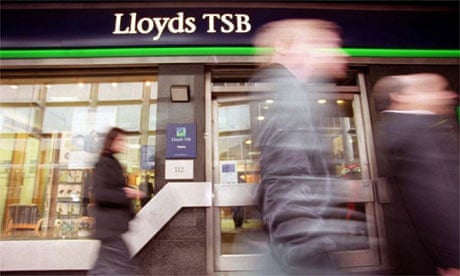Lloyds TSB is planning to reduce its unauthorised overdraft charges following complaints from customers about their size.
The revised charges will mean all customers – existing and new – who use an unplanned overdraft will pay less from 2 December, with 70% paying less than half the amount they are charged now.
Although the Office of Fair Trading and the previous government tried to exert pressure on banks to reduce their unauthorised charges, Mike Regnier, personal current account director for Lloyds TSB, said the move to reduce charges was in response to complaints from customers: "By far the biggest proportion of complaints in my mail bag is about unauthorised overdraft fees," he said.
The OFT took seven high street banks and a building society to court last year to establish whether it had the right to rule whether their unauthorised overdraft charges were fair. The OFT lost the case, but several banks, including Barclays, Santander and the Bank of Scotland and Halifax, which are part of the Lloyds group, still proceeded with the restructuring of their current account charging structure last year.
Regnier said the cut in charges to the Lloyds TSB accounts were coming later than those at the BoS and Halifax because their products were quite different and the banks were run independently,
Other changes to the bank's charging structure include the removal of the £15 monthly unplanned overdraft fee, which is being replaced by a £5 usage fee for any month in which a customer makes use of a planned or unplanned overdraft. Customers who have an added value, student or graduate account with an interest and fee-free overdraft arranged will not pay the £5 fee as long as they stay within the interest and fee-free amount.
Daily fees for unplanned overdrafts, which range from £6 to £20, will also be reduced to between £0 and £10 and the maximum number which can be applied in one month is falling from 10 to eight.
The returned item fee of £20, which is applied when a payment is bounced, is being halved, and the bank is introducing a fee-free and interest-free "buffer" zone of £10, again for both planned or unplanned overdrafts.
Commenting on Lloyds TSB's overdraft fee changes, which come into effect in December, head of banking at moneysupermarket.com Kevin Mountford said: "It is good to see further initiatives from a major player in the banking industry on overdraft charges, and the reduction of fees will certainly help some customers.
"For those who flirt with their overdraft every now again and keep under the £10 limit then the free buffer is helpful. If you go into the red without approval you will now be better off as the unplanned fee is being reduced from £15 to £5, but unfortunately those who go into their authorised overdraft will now pay an additional £5 for the privilege on top of the 18.9 per cent interest you are already charged. The free mobile banking service can only be seen as a positive initiative which will help consumers manage their finances.
"As ever, the devil is in the detail and consumers need to ensure they check the small print. It is important when choosing a current account to select one that will suit your needs; otherwise you could end up paying for unnecessary costs."
Following research into the current account market by the OFT, the banks agreed to provide clearer information about charges in the form of six "scenarios".
Using these as a basis, Lloyds will charge substantially less in every situation when the new charging structure is introduced, and in the fourth scenario (where the customer uses an unplanned overdraft for 10 days during the month and makes nine payments from the account while overdrawn) the charges will fall from £210 to £85.
The scenarios are available to view on the Lloyds website, and in its printed current account literature in branches by the end of the year. The banks have until June 30 to publish their scenarios.

Comments (…)
Sign in or create your Guardian account to join the discussion